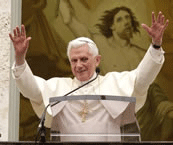ANGELUS
H.H. Benedict XVI
"Rediscover the Beauty of the Eucharist"
August 19, 2012
www.zenit.org
Dear brothers and sisters!
This Sunday's Gospel (cf. John 6:51-58) is the concluding part and culmination of Jesus' discourse in the synagogue at Capernaum, after he had the previous day fed thousands of people with only five loaves and two fish. Jesus reveals the meaning of that miracle; namely, that the time of the promise has been fulfilled: God the Father, who fed the Israelites with manna in the desert, now sent him, the Son, as the true Bread of life, and this bread is his flesh, his life, offered in sacrifice for us.
It is a matter, then, of receiving him in faith, of not being scandalized by his humanity, and of "eating his flesh and drinking his blood" (cf. John 6:54), in order to have the fullness of life. It is clear that this discourse is not offered to draw approval. Jesus knows this and he delivers it deliberately; and, in fact, it was a critical moment, a turning point in his public mission. The people, and his own disciples, were enthusiastic about him when he was performing miraculous signs; and even the multiplication of the loaves and the fish was a clear revelation that he was the Messiah, so much so that immediately afterward the crowd would have liked to carry Jesus away in triumph and proclaim him king of Israel. But this was not the will of Jesus, who precisely with this lengthy discourse, dampens the enthusiasm of many and provokes much dissent.
Indeed, in explaining the image of the bread, he states that he was sent to offer his very life, and that whoever wishes to follow him must unite himself to him in a deep and personal way, by participating in his sacrifice of love. For this reason, Jesus at the Last Supper would institute the Sacrament of the Eucharist: so that his disciples might have his charity within themselves -- this is decisive -- and as one body with him, prolong in the world the mystery of salvation.
In listening to this discourse, the people understood that Jesus was not a Messiah as they wanted, one who aspired to an earthly throne. He did not look for a consensus to conquer Jerusalem: indeed, He willed to go up to the Holy City in order to share the fate of the prophets: to give His life for God and for the people. The loaves, broken for thousands of people, would not result in a triumphal procession but would foreshadow the sacrifice of the Cross, in which Jesus would become Bread, his body and blood offered in expiation. Jesus offered the discourse in order to disillusion the crowds and, above all, to provoke a decision in His disciples. In fact, many among them, from that time on, no longer followed Him.
Dear friends, let us allow ourselves once again to be astonished by Christ's words: He, the grain of wheat thrown into the furrows of history, is the first fruits of a new humanity, freed from the corruption of sin and death. And let us rediscover the beauty of the Sacrament of the Eucharist, which expresses all of God's humility and holiness: He makes himself little -- God becomes little -- a fragment of the universe, to reconcile all things in His love. May the Virgin Mary, who gave the world the Bread of life, teach us to always live in profound union with him.
[Translation by Diane Montagna]
[After the Angelus, the Holy Father greeted the people in various languages. In English, he said:]
I greet all the English-speaking pilgrims and visitors present for this Angelus. In the Gospel of today's liturgy, Jesus presents himself as the living bread come down from heaven. May we always hunger for the gift of his presence in the Eucharistic sacrifice, wherein Jesus gives us his very self as food and drink to sustain us on our pilgrim journey to the Father. God bless all of you!
[In Polish, he said:]
I welcome all the Poles. During these days, the Patriarch of Moscow and All Russia, Kirill I, is a guest of the Orthodox Church in Poland. I cordially greet His Holiness and all of the Orthodox faithful. The program for this visit also included meetings with Catholic bishops and the common declaration of the desire to deepen their fraternal union and to collaborate in spreading Gospel values in the modern world, in the spirit of the same faith in Christ Jesus. This is an important event that inspires hope for the future. I entrust its fruits to the kindness of Mary, imploring God’s blessing. Praised be Jesus Christ.
[Overlooking the square in front of the Apostolic Palace, the Holy Father invited everyone to live well this time of year, which for many is one of calm and of rest,] "because it helps us to see things that normally we do not see, the beauty of creation, the beauty of the Creator, who knows us and loves us; it helps us, then, to be aware that behind all things there is a heart, the heart of the Creator. Let us learn this in these weeks," the Holy Father continued. "May the Lord bless you. I wish you blessed holidays and a blessed Sunday!"
| H.H. Benedict XVI-Angelus |

